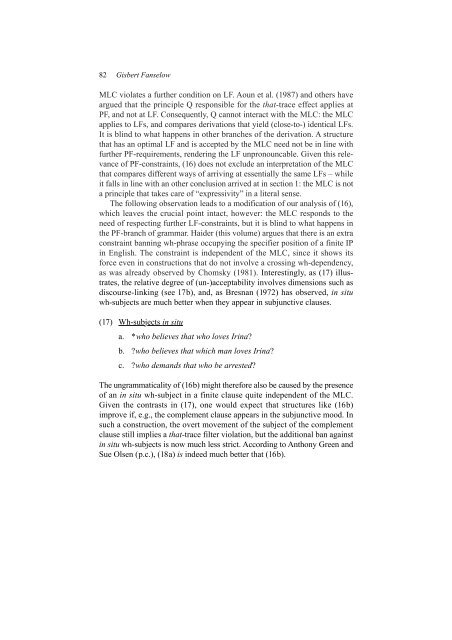Minimality Effects in Syntax · The MLC and Derivational Economy ...
Minimality Effects in Syntax · The MLC and Derivational Economy ...
Minimality Effects in Syntax · The MLC and Derivational Economy ...
You also want an ePaper? Increase the reach of your titles
YUMPU automatically turns print PDFs into web optimized ePapers that Google loves.
82 Gisbert Fanselow<br />
<strong>MLC</strong> violates a further condition on LF. Aoun et al. (1987) <strong>and</strong> others have<br />
argued that the pr<strong>in</strong>ciple Q responsible for the that-trace effect applies at<br />
PF, <strong>and</strong> not at LF. Consequently, Q cannot <strong>in</strong>teract with the <strong>MLC</strong>: the <strong>MLC</strong><br />
applies to LFs, <strong>and</strong> compares derivations that yield (close-to-) identical LFs.<br />
It is bl<strong>in</strong>d to what happens <strong>in</strong> other branches of the derivation. A structure<br />
that has an optimal LF <strong>and</strong> is accepted by the <strong>MLC</strong> need not be <strong>in</strong> l<strong>in</strong>e with<br />
further PF-requirements, render<strong>in</strong>g the LF unpronouncable. Given this relevance<br />
of PF-constra<strong>in</strong>ts, (16) does not exclude an <strong>in</strong>terpretation of the <strong>MLC</strong><br />
that compares different ways of arriv<strong>in</strong>g at essentially the same LFs – while<br />
it falls <strong>in</strong> l<strong>in</strong>e with an other conclusion arrived at <strong>in</strong> section 1: the <strong>MLC</strong> is not<br />
a pr<strong>in</strong>ciple that takes care of “expressivity” <strong>in</strong> a literal sense.<br />
<strong>The</strong> follow<strong>in</strong>g observation leads to a modification of our analysis of (16),<br />
which leaves the crucial po<strong>in</strong>t <strong>in</strong>tact, however: the <strong>MLC</strong> responds to the<br />
need of respect<strong>in</strong>g further LF-constra<strong>in</strong>ts, but it is bl<strong>in</strong>d to what happens <strong>in</strong><br />
the PF-branch of grammar. Haider (this volume) argues that there is an extra<br />
constra<strong>in</strong>t bann<strong>in</strong>g wh-phrase occupy<strong>in</strong>g the specifier position of a f<strong>in</strong>ite IP<br />
<strong>in</strong> English. <strong>The</strong> constra<strong>in</strong>t is <strong>in</strong>dependent of the <strong>MLC</strong>, s<strong>in</strong>ce it shows its<br />
force even <strong>in</strong> constructions that do not <strong>in</strong>volve a cross<strong>in</strong>g wh-dependency,<br />
as was already observed by Chomsky (1981). Interest<strong>in</strong>gly, as (17) illustrates,<br />
the relative degree of (un-)acceptability <strong>in</strong>volves dimensions such as<br />
discourse-l<strong>in</strong>k<strong>in</strong>g (see 17b), <strong>and</strong>, as Bresnan (1972) has observed, <strong>in</strong> situ<br />
wh-subjects are much better when they appear <strong>in</strong> subjunctive clauses.<br />
(17) Wh-subjects <strong>in</strong> situ<br />
a.*who believes that who loves Ir<strong>in</strong>a?<br />
b.?who believes that which man loves Ir<strong>in</strong>a?<br />
c.?who dem<strong>and</strong>s that who be arrested?<br />
<strong>The</strong> ungrammaticality of (16b) might therefore also be caused by the presence<br />
of an <strong>in</strong> situ wh-subject <strong>in</strong> a f<strong>in</strong>ite clause quite <strong>in</strong>dependent of the <strong>MLC</strong>.<br />
Given the contrasts <strong>in</strong> (17), one would expect that structures like (16b)<br />
improve if, e.g., the complement clause appears <strong>in</strong> the subjunctive mood. In<br />
such a construction, the overt movement of the subject of the complement<br />
clause still implies a that-trace filter violation, but the additional ban aga<strong>in</strong>st<br />
<strong>in</strong> situ wh-subjects is now much less strict. Accord<strong>in</strong>g to Anthony Green <strong>and</strong><br />
Sue Olsen (p.c.), (18a) is <strong>in</strong>deed much better that (16b).
















